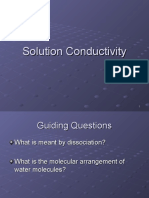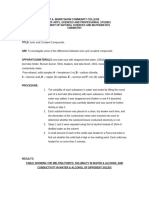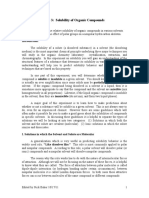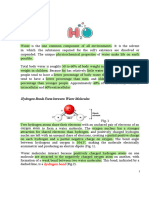Strong, Weak, or Non-Electrolyte?
Strong, Weak, or Non-Electrolyte?
Uploaded by
Sarah PetersonCopyright:
Available Formats
Strong, Weak, or Non-Electrolyte?
Strong, Weak, or Non-Electrolyte?
Uploaded by
Sarah PetersonOriginal Description:
Original Title
Copyright
Available Formats
Share this document
Did you find this document useful?
Is this content inappropriate?
Copyright:
Available Formats
Strong, Weak, or Non-Electrolyte?
Strong, Weak, or Non-Electrolyte?
Uploaded by
Sarah PetersonCopyright:
Available Formats
Strong, Weak, or Non-Electrolyte?
For the purposes of this course, use these criteria to determine if a substance is a strong,
weak, or non-electrolyte when dissolved in water (aqueous solution):
1. All ionic compounds are strong electrolytes, because they mostly break up into ions as
they dissolve in water. Even insoluble ionic compounds (e.g., AgCl, PbSO
4
, CaCO
3
) are
strong electrolytes, because the small amounts that do dissolve in water do so principally
as ions; i.e., there is virtually no undissociated form of the compound in solution.
2. Molecular compounds may be non-electrolytes, weak electrolytes, or strong electrolytes,
depending on whether they dissolve without ion formation, a little ion formation, or
mostly ion formation, respectively. Examples:
Molecular Compound Electrolyte Type Species in Solution
sucrose (table sugar) non-electrolyte molecules only
acetic acid (HC
2
H
3
O
2
= HOAc) weak electrolyte molecules and some ions
hydrogen chloride (HCl) strong electrolyte ions only
3. Strong acids and strong bases are strong electrolytes [e.g., HCl(aq), H
2
SO
4
(aq), HClO
4
(aq);
NaOH(aq)]. There are virtually no molecules of a strong acid or base in solution, only ions.
Know the strong acids and bases on the accompanying hand-out "Strong and Weak Acids
and Bases". Assume that any other acid or base you encounter in this course is weak, unless
told to the contrary. [Note: Mg(OH)
2
, an insoluble compound, is a strong base because it is an
ionic compound and therefore a strong electrolyte.]
You might also like
- CHM 130LL: Electrolytes Lab: Conduct Electricity. Ions Can Carry Electricity Across A Solution Between The ElectrodesDocument7 pagesCHM 130LL: Electrolytes Lab: Conduct Electricity. Ions Can Carry Electricity Across A Solution Between The Electrodes1828298 18282980% (1)
- Applied Chem. Task - FinishedDocument2 pagesApplied Chem. Task - Finishedjjshadownexus975No ratings yet
- 5 - ConductivityDocument5 pages5 - ConductivitydhanielieneNo ratings yet
- VII. Electrochemistry Acids Bases SaltsDocument11 pagesVII. Electrochemistry Acids Bases SaltsJasmine Nicole OsallaNo ratings yet
- Activity 1 PDFDocument3 pagesActivity 1 PDFAlthea ValenzuelaNo ratings yet
- Activity 1 Properties of Solutions in WaterDocument3 pagesActivity 1 Properties of Solutions in WaterAlthea ValenzuelaNo ratings yet
- Solution ConductivityDocument13 pagesSolution ConductivityVincent JohnsonNo ratings yet
- 01 - To investigate some of the differences between ionic and covalent compounds (1)Document4 pages01 - To investigate some of the differences between ionic and covalent compounds (1)Aisha PetersNo ratings yet
- Lecture Notes 1C Fundamentals of Chemistry 2019Document13 pagesLecture Notes 1C Fundamentals of Chemistry 2019Tango Jhecee Meir, D.No ratings yet
- 351expt 01 Solubility 230914 172803Document5 pages351expt 01 Solubility 230914 172803noNo ratings yet
- Acid BaseDocument17 pagesAcid BaseNia LisnaNo ratings yet
- 351expt 01 Solubility PDFDocument3 pages351expt 01 Solubility PDFnathasyaNo ratings yet
- 351expt 01 Solubility PDFDocument3 pages351expt 01 Solubility PDFProsNo ratings yet
- Chapter_ 4_Chemical ReactionsDocument52 pagesChapter_ 4_Chemical ReactionsdenzelkamandeNo ratings yet
- 215LabManual PhysProps Jan18Document5 pages215LabManual PhysProps Jan18bigcheeseNo ratings yet
- 4 Reactions in Aqueous SolutionDocument21 pages4 Reactions in Aqueous SolutionYingfang LiNo ratings yet
- Chemistry Ch.4 NotesDocument2 pagesChemistry Ch.4 NotesAnyaNo ratings yet
- Chemistry Project On Ionic Equilibria For Hutchings Junior College.Document18 pagesChemistry Project On Ionic Equilibria For Hutchings Junior College.edu.rupshreyaNo ratings yet
- ELECTROLYTES Mechanics AssignmentDocument4 pagesELECTROLYTES Mechanics Assignmentbighnesh.2006.singhNo ratings yet
- Electrolytic SolutionDocument101 pagesElectrolytic Solutional.3sal2004No ratings yet
- Advanced ChemistryDocument137 pagesAdvanced ChemistryMaheshNo ratings yet
- Chemistry of Life: By: Ruth Abigail C. ValdezDocument39 pagesChemistry of Life: By: Ruth Abigail C. ValdezPanJan BalNo ratings yet
- Electrolyte and NonDocument7 pagesElectrolyte and NonSuwahono, M.PdNo ratings yet
- CHM ReportingDocument70 pagesCHM ReportingNica Rose GrozenNo ratings yet
- Unit 3 Solutions POWERPOINT 3Document81 pagesUnit 3 Solutions POWERPOINT 3Jenny YoonNo ratings yet
- Experiment 5 Dissimilarity Between Ionic and Covalent CompoundsDocument5 pagesExperiment 5 Dissimilarity Between Ionic and Covalent CompoundsNurasyilah YakubNo ratings yet
- Arrhenius Theory of ElectrolyticDocument9 pagesArrhenius Theory of ElectrolyticKaFiAliMirzaNo ratings yet
- Ions in Solution - Weak and Strong ElectrolytesDocument4 pagesIons in Solution - Weak and Strong Electrolytesjimmymungai018No ratings yet
- Zumdahl Chapter 4 (Section 4.1 - 4.4)Document26 pagesZumdahl Chapter 4 (Section 4.1 - 4.4)Spidy MoveNo ratings yet
- chemistryDocument18 pageschemistryjawaramamasa62No ratings yet
- Chem Analysis 1 Refined AnswersDocument3 pagesChem Analysis 1 Refined AnswerslaracrabbNo ratings yet
- Ionic EquilibriumDocument93 pagesIonic EquilibriumhappyNo ratings yet
- Differences_Between_Ionic_and_Covalent_CompoundsDocument13 pagesDifferences_Between_Ionic_and_Covalent_CompoundsChelle TarangNo ratings yet
- Biological Molecules NotesDocument10 pagesBiological Molecules NotesSamantha SinghNo ratings yet
- Lab 3: Solubility of Organic Compounds: ObjectivesDocument12 pagesLab 3: Solubility of Organic Compounds: ObjectivesJAN CAMILLE OLIVARESNo ratings yet
- 4.5 SolubilityDocument6 pages4.5 SolubilityAranganayagam K RamasamyNo ratings yet
- Acidic BufferDocument8 pagesAcidic Bufferswapnildebnath160No ratings yet
- Chapter 2: Small Molecules Chemical Bonds: BIOL 112 Notes Jan 11th-Jan 13thDocument10 pagesChapter 2: Small Molecules Chemical Bonds: BIOL 112 Notes Jan 11th-Jan 13thCaroline DonovanNo ratings yet
- Hydrolysis of IonsDocument4 pagesHydrolysis of Ionsmawuli1997No ratings yet
- Reactions in Aqueous U4Document108 pagesReactions in Aqueous U4lieu.huynhkim0520No ratings yet
- Biology STPM Lower 6 Chapter 1Document9 pagesBiology STPM Lower 6 Chapter 1kmbej91% (11)
- Acids Bases and Salts 3Document145 pagesAcids Bases and Salts 3Austin KuoNo ratings yet
- Chemistry For Engineers Laboratory 2Document10 pagesChemistry For Engineers Laboratory 2John Melbourne GalvanNo ratings yet
- C - Done at School - To Move Home Strong and Weak Acids and Bases Phet LabDocument2 pagesC - Done at School - To Move Home Strong and Weak Acids and Bases Phet Labapi-262304087No ratings yet
- Expt 1 (Solubility of Organic Compounds) PDFDocument3 pagesExpt 1 (Solubility of Organic Compounds) PDFanon_253019003No ratings yet
- Lec 1. Electrolytes-1Document28 pagesLec 1. Electrolytes-1Falak SherNo ratings yet
- 4.7 Intermolecular ForcesDocument5 pages4.7 Intermolecular ForcesrachpNo ratings yet
- Electrolyte and Redox: Chemistry ReportDocument7 pagesElectrolyte and Redox: Chemistry ReportGrace KahonoNo ratings yet
- 3-Chemical BasisDocument45 pages3-Chemical BasisNur Alia Khairul AnuarNo ratings yet
- 1-1 Lecture, AdditionDocument10 pages1-1 Lecture, AdditionAnonymous guyNo ratings yet
- WACE CPTR 4 Solutions PDFDocument50 pagesWACE CPTR 4 Solutions PDFJeremy SowNo ratings yet
- University of The Philippines ManilaDocument3 pagesUniversity of The Philippines ManilaYaka Chan ShirokageNo ratings yet
- The Child With A Fluid and Electrolyte Alteration: Body Water Is Located in Two Major CompartmentsDocument19 pagesThe Child With A Fluid and Electrolyte Alteration: Body Water Is Located in Two Major CompartmentsAyeza DuaNo ratings yet
- 6) Properties of Ionic and Molecular Compounds & H2ODocument23 pages6) Properties of Ionic and Molecular Compounds & H2Omiaisthebest702No ratings yet
- Anatomy and Physiology: Chemistry and the Body: Things You Should Know (Questions and Answers)From EverandAnatomy and Physiology: Chemistry and the Body: Things You Should Know (Questions and Answers)No ratings yet
- GCSE Chemistry Revision: Cheeky Revision ShortcutsFrom EverandGCSE Chemistry Revision: Cheeky Revision ShortcutsRating: 4.5 out of 5 stars4.5/5 (3)
- Practice Makes Perfect in Chemistry: Acids, Bases, and Salts with AnswersFrom EverandPractice Makes Perfect in Chemistry: Acids, Bases, and Salts with AnswersNo ratings yet



























































